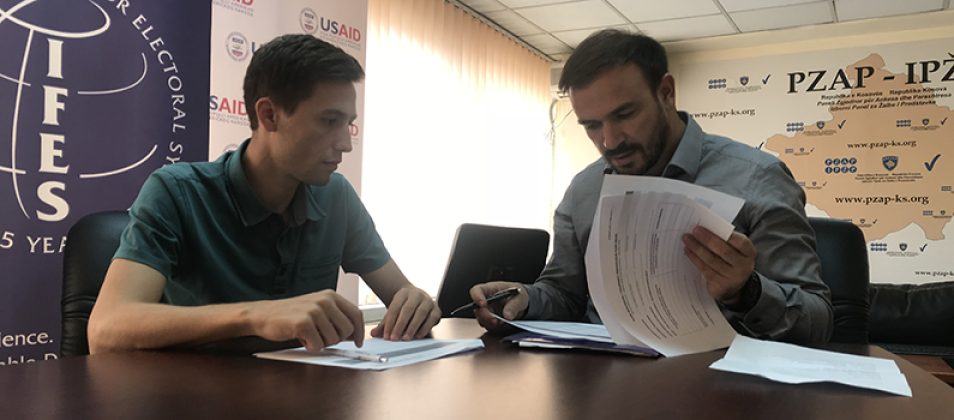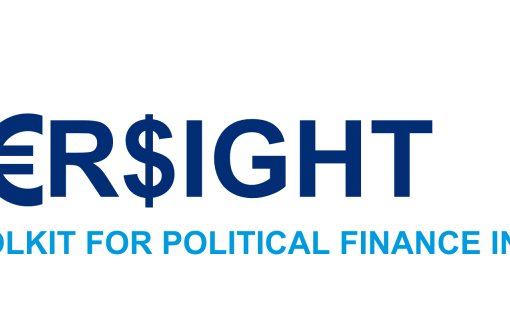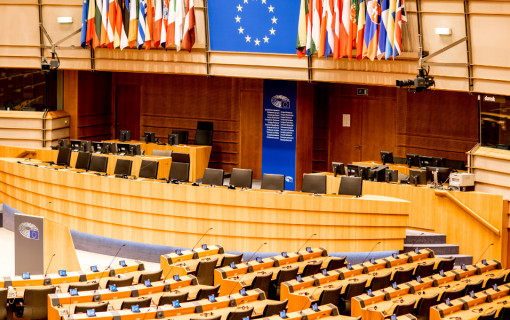
Supporting Kosovo Election Staffers’ Professional Development
by Brian Polk*
At many international development organizations, significant effort is invested in improving the operational capacity of various institutions – election management bodies, civil society groups, government institutions, etc. It is easy to imagine these entities as monolithic units or impersonal government bodies. In reality, the International Foundation for Electoral Systems’ (IFES) and other organizations’ partners are comprised of individuals with their own strengths, weaknesses and goals. Engaging these partners on a micro-level – what drives the individuals who comprise them, where these staff can personally improve – thus offers a unique angle to building their capacity.
In the small western Balkan country of Kosovo, IFES’ team has initiated a noteworthy program for Election Complaints and Appeals Panel (ECAP) Secretariat staffers, as part of the United States Agency for International Development (USAID) funded Strengthening Election Administration Activity in Kosovo (SEAA). Spearheaded by IFES Program Officer Gazmend Berlajolli, personal development plans (PDP) have been designed in collaboration with ECAP leadership. Through previous research, IFES’ Kosovo team understood that on-the-job learning and development are “a great contribution that ideally complements formal training programs. Since the ECAP Secretariat is a small body, we thought designing PDPs was a) feasible and b) would allow us to tailor staff development by unlocking staff potential even more.” Unlike large-scale training exercises, where dozens or even hundreds of participants may be engaged simultaneously, PDPs are exclusive to individuals, and include “[establishing] goals, activities and timelines for each individual through an extensive coaching process,” according to Berlajolli. During one-on-one coaching and brainstorming sessions with Berlajolli, ECAP staff identify actionable goals and paths to personal and professional growth. They then track these objectives through PDP goal-monitoring mechanisms, formatted to help address three separate but interconnected aspects of personal and professional growth: self-evaluation, goal setting, and long-term career objectives.
The execution of ECAP Secretariat PDPs is inextricably linked to the growth of the ECAP as an institution. Berlajolli states that “if managers are supportive and actively involved in creating conditions for staff to move forward with implementation of PDPs, not only will they see the professional growth of employees, but the institution overall will become more efficient and productive… we anticipate drafting of legal acts and decisions being done faster, more accurately and effectively, as well as increasing productivity with case handling. These specific improvements would…contribute to increased credibility and trust of stakeholders in the institution.” IFES’ PDP work is the first time that ECAP Secretariat members have designed actionable plans based on their individual career development needs.
Despite the great promise of the PDPs, implementing them has not always been smooth. Though civil servants in Kosovo are obligated to undergo some form of professional development training, intense, personalized approaches like PDPs are uncommon. Many ECAP Secretariat staff were unfamiliar and uncertain about the process early on. Berlajolli reflects that “the most challenging part in this process was the initial coaching sessions with staff, which were crucial for establishing a comfortable environment to speak freely, be open to various learning opportunities and accept the solutions later on.” Despite the doubt of some ECAP participants at the onset of the program, many came to embrace PDPs wholeheartedly. One Secretariat member proudly reflected that “I always had ideas about certifications I could acquire or things I could do to improve my skills, but was hesitant to take action. It always remained in the back of my mind. Now, after seeing the final version of my PDP, I think that these ideas are feasible. My professional development in the year ahead is all laid out for me, and I am so excited to walk through all these steps.”
Berlajolli states that “the process of assisting the ECAP staff with their PDPs was itself motivating since coaching sessions were very engaging and encouraging. Those helped the ECAP staff design and shape their own personal career growth. I hope to see ECAP become a role model for other public institutions for the approach they took in institutionalizing PDPs, and making them a standard requirement for staff development in future years.” Time will reveal the institutional impact of PDPs on the ECAP. Nonetheless, through SEAA, Berlajolli and IFES’ investment in the “human potential” of the ECAP secretariat is already a remarkable and inspirational achievement.
This story is made possible by the generous support of the American people through USAID under Award No. AID-167-LA-16-00001. The opinions expressed herein are those of the author and do not necessarily reflect the views of USAID or the United States Government.
*Brian Polk is a program associate with IFES’ Europe and Eurasia division.










